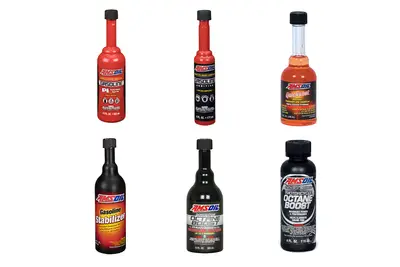Amsoil vs Ethanol
 |
Amsoil fuel additives are the epitome of what snake oils are.
 Marc Rauch |
Author of THE ETHANOL PAPERS and YES, TIN LIZZIE WAS AN ALCOHOLIC
Exec. Vice President/Co-Publisher
THE AUTO CHANNEL
There's a lot of crappy products being manufactured and sold, and not all are from China. Over the past several years I've had the opportunity to analyze a few of the most well-known engine additives that are supposedly designed to combat or fix problems caused by ethanol fuel. I dare say that in each case I was able to prove that the claims made by the manufacturers were false, or at least extremely exaggerated. The brands and products I previously wrote about are:
• Gold Eagle's HEET and ISO-HEET
• Lucas' SAFEGUARD ETHANOL FUEL CONDITIONER
• BC3's FUEL LIFE, ETHANOL SHIELD FUEL STABILIZER
• Bell Performance's ETHANOL DEFENSE
A brand and products that I hadn't written about are the Amsoil additives. I'd like to think that I never miss an opportunity to smack down stupid anti-ethanol claims, but I never came across any specific opportunity to discuss Amsoil...until very recently.
 |
Here's what happened: One of The Auto Channel's readers sent me a YouTube video link to a certified garage mechanic who produced and posted a video on the use of ethanol fuel. This mechanic claims to like ethanol but he still issued a silly anti-ethanol claim. He states that because ethanol is made using water that after the ethanol molecules combust in the cylinders it leaves water in the cylinders, which then causes corrosion in the engine. He concluded that this is proven because water can be seen dripping out of a vehicle's exhaust pipe after the engine has cooled. I've heard lots and lots of ridiculous anti-ethanol claims, but never this one.
I responded and told this certified engine mechanic that when the ethanol molecules combust that they vaporize and that no water is left behind. I further explained that the water that sometimes comes out of a tailpipe is caused by natural condensation and that it has always occurred, including during all the decades before the advent of the Renewable Fuel Standard and the introduction of ubiquitous ethanol-gasoline fuels such as E10, E85, or any blend in-between.
In response to my reply to the certified mechanic, another reader posted the same comment 3 or 4 times. He wrote: "Just use Amsoil engine additive." Now, if he only posted it once I probably would not have responded. But, because he posted it over and over, I thought I would take a closer look at the Amsoil engine additive...or I should say Amsoil's multiple engine additives. It turns out that Amsoil makes 6 fuel additives and since the guy didn't expressly name which additive he was referring to, I looked at them all. Here are my findings:
1. AMSOIL Upper Cylinder Lubricant
Amsoil states the following:
"Your engine’s top-end is sparsely lubricated and prone to the development of performance-robbing deposits. It’s also highly susceptible to corrosion, an issue compounded by the prevalence of ethanol in today’s fuel. AMSOIL Upper Cylinder Lubricant is designed to solve those issues. Its AMSOIL-exclusive, powerful formulation helps maximize engine power and performance while increasing engine life."
This product may very well do what Amsoil claims. Why? Because it contains alcohol. The spec sheet doesn't say if the alcohols are ethanol, methanol, or isopropanol, but it doesn't matter because any of these alcohols are less corrosive than gasoline and aromatics, and they would all work to keep the cylinders clean. Incidentally, ethanol is the cleanest and best of the possible alcohols that could be contained in this product.
Conclusion: Ignore the claim that ethanol causes "Upper Cylinder" engine issues and just buy ethanol-gasoline fuel blends and save yourself the cost of this snake oil.
2. P.i. Performance Improver Gasoline Additive
Amsoil claims that P.i. Performance Improver:
-
• Restores up to 14% horsepower
• Restores GDI fuel injectors to 100% flow rate after one tank of fuel
• Improves fuel economy • Reduces need for costly higher-octane fuel • Helps prevent carbon rap
• Controls pre-ignition knock
• Compatible with capless fuel systems
This product probably does do what Amsoil claims. Why? Because it contains alcohol. The spec sheet on this product also doesn't say if the alcohols are ethanol, methanol, or isopropanol, but it doesn't matter because any of these alcohols would increase horsepower; clean fuel injector; improve fuel economy; reduce the need for costly higher octane gasoline and aromatic ingredients (such as benzene, xylene, and toluene); prevent carbon build-up, stop engine knock, and is compatible with all fuel systems. Incidentally, ethanol is the cleanest and best of the possible alcohols that could be contained in this product.
Conclusion: Just buy ethanol-gasoline blends and save yourself the cost of this snake oil.
3. Gasoline Stabilizer
Amsoil claims that its Gasoline Stabilizer:
• Helps keep fuel fresh up to 12 months
• Protects against varnish and gum buildup
• Fights ethanol corrosion
• Ideal for stored seasonal equipment such as snowmobiles, lawnmowers, motorcycles and boats
This product contains hydrogenated oils. Hydrogenated oils are used to keep foods fresher for longer periods. In other words, hydrogenated oils are a preservative. Coincidentally, ethanol is also a preservative and used to keep foods and beverages fresher for longer. Hydrogenated oil has hydrogen in it. Ethanol also has hydrogen in it. Hydrogenated oils are made from plants and crops. Ethanol is made from plants and crops. Since ethanol is less corrosive than gasoline and aromatics, and ethanol doesn't create the gum that can form in an engine and then turn into a hard varnish-like substance, there's nothing that hydrogenated oils can do that ethanol doesn't already do.
Conclusion: Just buy ethanol-gasoline blends and save yourself the cost of this snake oil.
4. Quickshot
Amsoil claims that its Quickshot product:
CLEANS FUEL SYSTEMS
• Cleans varnish, gum, and insoluble debris that clogs carburetors, fuel injectors, and fuel filters in powersports equipment and small engines.
• Quickly detaches and carries away fuel-system deposits, while also cleaning hard-to-remove deposits on piston tops, spark plugs and other combustion-chamber parts.
• Helps reduce pre-ignition, rough idling and poor throttle response, restoring peak performance.
FIGHTS ETHANOL PROBLEMS
• Designed to keep water due to ethanol dispersed in tiny molecules throughout the fuel tank, moving it out as a normal part of operation.
• Helps maintain engine performance and protects against damaging corrosion.
• Decreases the chance of ethanol separating from the gasoline, helping prevent lean-burn and combustion-chamber damage.
This product contains hydrogenated oils and kerosene as its active ingredient to accomplish its goals. I've already discussed hydrogenated oils, so I'll focus on the kerosene component. Ethanol burns clean and dries clean. Ethanol does not cause the gummy remnants, the gum is caused by gasoline. When the gum gets old and dries it turns into the hard varnish-like substance that can truly damage an engine. Ethanol does not leave burnt debris, this is caused by the inefficiency of gasoline burning. It is this debris that fouls spark plugs and clogs the system. Pre-ignition and engine knock are caused by low octane fuel. Kerosene has a lower octane rating than gasoline (and gasoline without a higher octane ingredient causes engine-knock). Ethanol has a much, much higher octane rating than kerosene, and a higher octane rating than even premium gasoline - this is one of the important reasons why ethanol is added to gasoline - to increase the octane level and stop engine knock.
Water forms in the fuel system because of natural condensation. Condensation will occur whether ethanol or another alcohol is present or not. Ethanol, or another alcohol, is the most expedient way to remove the water that forms naturally. Kerosene doesn't do this. Ethanol is compatible with more types of rubber, plastic, and metal than gasoline, aromatics, or kerosene. This means that ethanol is LESS corrosive than gasoline, aromatics, and kerosene. Phase separation occurs because gasoline and aromatics can not absorb water very well. Phase separation can take place whether or not ethanol/alcohols are present. Kerosene does not have the hygroscopic ability to absorb water the way that ethanol does.
Conclusion: Just buy ethanol-gasoline blends and save yourself the cost of this snake oil.
5. Dominator Octane Boost
Amsoil claims that its Dominator Octane Boost:
- • Increases octane up to 4 numbers for improved performance • Maximizes power
• Reduces engine knock
• Improves ignition & responsiveness
• Helps fuel burn more cleanly
• Removes carbon deposits This is another Amsoil additive that relies on hydrogenated oils.
The co-ingredient is Methylcyclopentadienyl manganese tricarbonyl (MMT for short). Hydrogenated oil has already been discussed and shown to offer nothing of value that is superior to ethanol. MMT is the ingredient that adds octane. MMT is a highly poisonous substance and a neurotoxin. The quantity of MMT used may not be an immediate concern to all living sentient creatures, but why would we need more poisons at any level in our atmosphere? MMT is not a superior oxygenate compared to ethanol (un-denaturized ethanol, by comparison, can be safely consumed on a regular basis).
Whatever MMT can do for internal combustion engines and fuel, ethanol can do it safer and better.
Conclusion: Just buy ethanol-gasoline blends and save yourself the cost of this snake oil.
6. Motorcycle Octane Boost
Amsoil claims that its Motorcycle Octane Boost:
• Increases octane up to three numbers
• Maximizes power & performance
• Helps eliminate engine knock & ping
• Cleans harmful deposits
Amsoil's Motorcycle Octane Boost is the same stuff as its Dominator Octane Boost. The only difference is that it comes in a bottle that is about a third of the size and half the price. If the ingredients of Dominator Octane Boost offers no benefits to four-wheel vehicles, then there's no reason to expect Motorcycle Octane Boost to provide any benefits to two-wheel vehicles.
Conclusion: Just buy ethanol-gasoline blends and save yourself the cost of this snake oil.
There you have it, my review and analysis of the six Amsoil engine fuel additives. As I stated at the top, "Amsoil fuel additives are the epitome of what snake oils are." They do nothing that ethanol doesn't do cleaner, safer, and less expensively because the ethanol is already included in the fuel you pump into your vehicles. In short, the only problem with ethanol-gasoline blends is that they have gasoline in them!
To read my previous fuel additive debunkings please visit the links below:
Famous Manufacturer of Anti-Ethanol Additives Proves Ethanol's Safety and Benefits
Automotive Aftermarket Saturated with Snake Oil Engine Additives
Bell Performance Disputes Our Ethanol Hygroscopy Test and THEY FAIL MISERABLY!
Battling Anti-Ethanol Snake Oil Myths
ABOUT THE AUTHOR
Marc J. Rauch is a multi-award winning TV/film writer, producer and director and has been a broadcasting and marketing executive for more than 50 years. In 1995, Marc wrote and published "MARCETING - The Book On Effective Advertising and Promotion." This book was updated and re-published in 2005 with additional chapters covering the Internet and online marketing.
In 1987, Marc co-founded The Auto Channel television network, and TheAutoChannel.com a few years later. Marc serves as the company's Executive Vice President and Co-Publisher. TheAutoChannel.com is the Internet's largest and oldest automotive information resource, with more than 1.5 million pages of content. Marc is a leading advocate of alternative fuels and energy; writing, lecturing and making numerous broadcast appearances regarding these issues. He's traveled to Taiwan to speak at the Asia-Pacific Economic Cooperation Forum on behalf of the U.S. Department of Agriculture, he's presented testimony on the use of ethanol before Congressional debriefings in Washington on two occasions, was a keynote speaker at the 2016 Australian National Biofuels Conference, and was a featured speaker at the 2018 National Ethanol Conference in San Antonio, Texas. In 2019, Marc wrote and published "THE ETHANOL PAPERS," a 600-page book that presents the whole story on ethanol fuels. In 2021, Marc published his extended essay "YES, TIN LIZZIE WAS AN ALCOHOLIC" about Henry Ford's Model T in book form and is available from AMAZON BOOKS.



